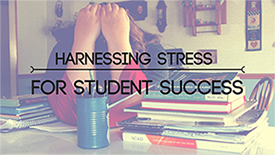Harnessing Stress for Student Success
Written by Taylor Quinn
Published on April 6, 2016
 Unfortunately, stress will always be a part of a student’s life– even more so when the student has a reading disability. But, what if your child harnessed their stress to make it work in their favor? Kelly McGonigal, a health psychologist, and lecturer at Stanford University recently presented a TedTalk explaining how to do just that.
Unfortunately, stress will always be a part of a student’s life– even more so when the student has a reading disability. But, what if your child harnessed their stress to make it work in their favor? Kelly McGonigal, a health psychologist, and lecturer at Stanford University recently presented a TedTalk explaining how to do just that.
At a recent “Learning and the Brain” conference McGonigal said, “In a number of situations, accepting and embracing the stress instead of trying to calm down helped students to do better.”
The physical side effects stress produces can often make students underperform. McGonigal calls that reaction a “threat response” to stress, but says if teachers can help students have a different response. She calls this positive response to stress a “challenge response,” which includes the realization that the student has the resources to handle the situation.
McGonigal makes sure to mention that prolonged “threat response” stress can have negative effects on health, and suggests three intervention techniques to help students change their approach to stress and create resiliency for dealing with anxiety.
Caring for others builds resiliency against stress
 The biological reaction to stress naturally includes a desire to connect with others. Focusing on social relationships and closeness can dramatically reduce the harmful negative effects of stress.
The biological reaction to stress naturally includes a desire to connect with others. Focusing on social relationships and closeness can dramatically reduce the harmful negative effects of stress.
Purpose in life reduces stress
Ask your child what they love to do, and support their hobbies. Remind them how that activity makes them feel and reward them for their interest and determination.
Focus on how stress can help students grow
McGonigal makes the point that if you are able to look back on your life and tell yourself a story about your stress that includes how you learned from it, it helps to create a narrative of strength, learning, and growth.
The Orton-Gillingham method focuses on building students up and harnessing the “good stress” that McGonigal speaks to. If you would like to set up a consultation with one of our trained therapists, you can visit this page on our website.
Improve Your Child’s Reading
Learn more about Lexercise today.
Schedule a FREE
15-minute consultation

